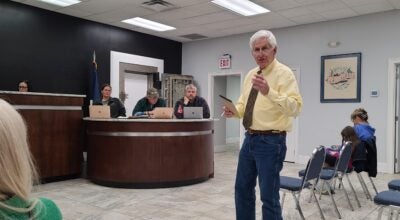Legislative committees wrap up interim
Published 12:51 pm Tuesday, December 7, 2021

- State Rep. Daniel Elliott
By Daniel Elliott
State Representative, District 54
With just a little more than 30 days before we convene on January 4, interim committees are finishing their work. That means our attention has turned almost fully to using what we have learned during the interim to craft policies that will benefit Kentuckians. I am excited, because although we have litany of issues to tackle, with every challenge comes opportunity. We will be adopting a new budget that will provide guidance for our state’s priorities, appropriating about a billion in federal COVID-relief dollars, and working to help Kentuckians as they navigate inflation, supply shortages, and labor shortages. Of course, as you read this update news is spreading about Omicron, a new variant of the virus spreading across the globe. We have a plate full, but I am optimistic that we can focus on our priorities and come out on top. This will be my last weekly review until session begins, but I am combining the last week of November with the first week of December to provide a summary of some of the final interim meetings.
• IJC on Local Government: Members met to discuss the legislative priorities brought forth by the statewide association that represents county governments. The discussion included jail reform. There are currently 21,000 inmates in Kentucky county jails and counties are struggling because of funding issues. County leaders also used the opportunity to again advocate for a constitutional amendment that would allow the legislature to modernize local taxes to better reflect the economy and needs of today.
• IJC on State Government: Committee members concluded their last meeting with a review of both prefiled legislation and the impact of the Biden administration’s federal COVID-related guidance. One of the prefiled bills discussed, BR 40, would change how overtime worked during an emergency impacts a state employee’s pension. This measure would exempt anti-pension spiking provisions for any overtime directly attributable to an emergency when the Governor calls in the Kentucky National Guard. Another measure, BR 341, would require an actuarial investigation of the economic assumptions (inflation, investment return, payroll growth) every two years. This type of report is required every five years now, but greater frequency would help tremendously with oversight. Under the proposal, demographic assumptions (mortality, withdrawal and retirement rates) would remain on a five-year schedule.
• IJC on Health, Welfare, and Family Services: The committee discussed at great length the potential for expanding the role of advanced registered nurse practitioners (ARNPs). Currently, Kentucky law is consistent with neighboring states. However, advocates for expanding the role of ARNPs point to the potential benefit of increasing accessibility to health care in areas that struggle to recruit enough physicians. Those opposed to expanding the scope of practice are concerned that doing so may lead to over reliance on prescription drugs like opioids and higher medical costs.
• Commission on Race and Access to Opportunity: The Commission on Race and Access to Opportunity met for their last meeting of the interim this week to hear from Kentucky Youth Advocates (KYA), who presented their legislative priorities for the 2022 Regular Session. KYA requested lawmakers address disparities in the opportunities available to Kentucky children based on a number of factors, including race, geographic location, and income. The commission is specifically interested in these disparities and charged with determining not only what actually causes them but how resources can be used to level access to opportunities.
• Medicaid Oversight and Advisory: The Medicaid Oversight and Advisory Committee dove into several recurring issues as Kentucky struggles to improve the health of its population as its Medicaid budget continues to expand. Lawmakers looked into alternative approaches to delivering Medicaid services with the goal of allowing individuals to remain integrated into an affordable community setting as much as possible. As pressure on the Medicaid system mounts, we are looking to what does and does not work in other states. One possible approach would expand Medicaid coverage to include assisted living. More than 5 percent of Kentucky nursing home residents have low needs but are placed in advanced care homes. Placing these individuals in an assisted living home could potentially save the state $50 million annually.
• IJC on Banking and Insurance: Members discussed federal home loan bank lending parity and the US Treasury IRS bank account reporting proposal. Members shared concerns from constituents that this new requirement will impact the privacy of their banking transactions.
• IJC Veterans, Military Affairs, and Public Protection: Legislators highlighted legislative priorities from several stakeholder organizations, including the Joint Executive Council of Veterans Organizations of Kentucky (JEVCO). JEVCO detailed the need for increasing the budget for the Kentucky Department of Veterans Affairs, along with the reauthorization of the legislation passed in 2021 that granted tax exemption provisions to certain Veteran Service Organizations like VFWs. Additionally, the committee heard testimony from representatives from Fort Knox, which described the need for a military disclosure clause in home contracts near the post to ensure buyers are aware of the conditions surrounding them.
As always, I hope you will feel free to contact me with any questions or issues. I can be reached here at home anytime or through the toll-free message line in Frankfort at 1-800-372-7181. Please feel free to email me at Daniel.Elliott@LRC.KY.GOV. If you would like more information about any of these committees or legislative actions, you can visit the Legislative Research Commission website at legislature.ky.gov.






